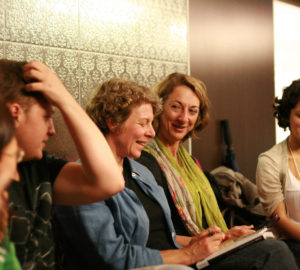Writing is not something I do; it is something I can’t do without.
My journey as a writer began at the tender age of eight when I submitted my story entitled “The Ladybirds” to the national weekend newspaper. To my surprise, it was published, together with my childish illustration of Larry and Lucy Ladybird and their two children. They were a happy family, something I longed for from an early age.
I was delighted by my success as a published writer.
Some years later, as a legal professional, I was surprised to learn that my final-year thesis had been acknowledged by way of publication, this time in the prestigious South African Law Journal. I was happy to discover I was also being awarded the annual prize for the best-written article.
Flash forward a few years later: I’d left my profession, along with two failed marriages and three young children. My father had recently shuffled off this mortal coil, and I was left bereft, not knowing what to do with the unexpressed emotions that swirled around like a whirlpool in my inner world.
Ours had been a troubled relationship, and I wasn’t sure how I felt about his passing, or how I was supposed to feel. I resolved this emotional quandary by taking myself off to a warm tropical paradise, far away from the cold I felt in my bones in the un-maternal home called the ‘Mother City’ – Cape Town.
I was thrilled to escape the cold within and without, and finally made my peace, and said my piece to my late father in the warmth of the Indian Ocean. I spent my unshed tears, mingling with the saline ocean, and felt finally at peace about the events that characterized my early life, and around my father’s death.
Upon my return home, I picked up the local newspaper to see a small advertisement for a national writing competition with the theme, “Murmurs of the Girl in Me”. I could not resist, and speedily bashed out my story relating to my turbulent relationship with my father, and how I finally made peace with him.
I realised that the competition deadline was that very day, and had trouble sending my story off. My emails weren’t going through, and my fax was not working. As a last-ditch attempt, I sent it to a friend at her shop down the road. Her printer was jammed. So, finally, it was printed at the Internet café across the road, and speedily sent off. I telephoned with an apology, asking for clemency as I’d missed the noon deadline. I was assured by a sweet voice that it was all right, but I didn’t hold much hope in this regard. I duly forgot all about the story and the competition. After all, I’d written the story for me, and only seemed to be at my most efficient when there was a deadline looming.
Three months later I was lying in bed fighting the flu when my telephone rang at home, waking me. I picked it up.
“Hi Ma,” as my mother is virtually the only person who calls me on that number.
“Uh, is that Ms. Françoise Lempereur?” a commanding voice enquired.
I cleared my scratchy throat and answered yes.
The well-spoken voice went on to inform me that I was a prizewinner in the competition I’d entered. Groggy and disoriented, I had no clue what she was talking about, except that she had specifically asked for me by name.
I was as excited as I could be in my condition, but promptly went back to sleep at the end of the phone call, and relegated the call to the distant recesses of my mind.
A few weeks after this, the well-spoken voice called again. She was the main judge, as it turned out, and she informed me that I wasn’t just any prizewinner. I had won first prize!
My story was to be published in an anthology of the best entries, and I was invited to attend the launch in my birthplace of Johannesburg. I was thrilled to have been acknowledged, and of course, for the privilege of being there at the book launch. I flew up for a long weekend, expecting nothing but anonymity, but was stunned to learn that the prizewinner in each of the three categories was to read an excerpt of their work. I balked; ‘personal essay’ describes how I felt about my work. It was far too personal to share out loud, publication aside.
The judge in question looked at me, then at my story, and loudly declared, “No, yours is too good to read just an excerpt: you will have to read the entire thing.”
I know I should have been proud, and I was, but the thought of standing before two hundred people and exposing myself was quite simply terrifying. I shook my head furiously, but she was having none of it, and turned on her heel, leaving me standing petrified to the spot.
My longest-standing friend Paula, who grew up alongside me, and who had accompanied me and knew the circumstances of my life, laughed out loud: “Oh, for Pete’s sake, you know you can do this. Get on with it!”
She shoved me along, and I went, reluctantly, feeling like my heels were digging furrows in the ground. Paula laughed afterwards, saying I looked about five years old, my pages quivering along with my skinny legs. It took me ages to stop shaking.
She also told me that I spoke so quietly that there was not a sound in that auditorium, and when I finally looked up into the crowd, there was not a dry eye to be seen.
It was then that I felt really proud.
About the Author: Françoise Lempereur wins the May 2013 My Writing Journey Competition with her story.
Picture credit: Flickr.com Stefan 1981













